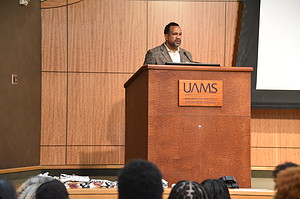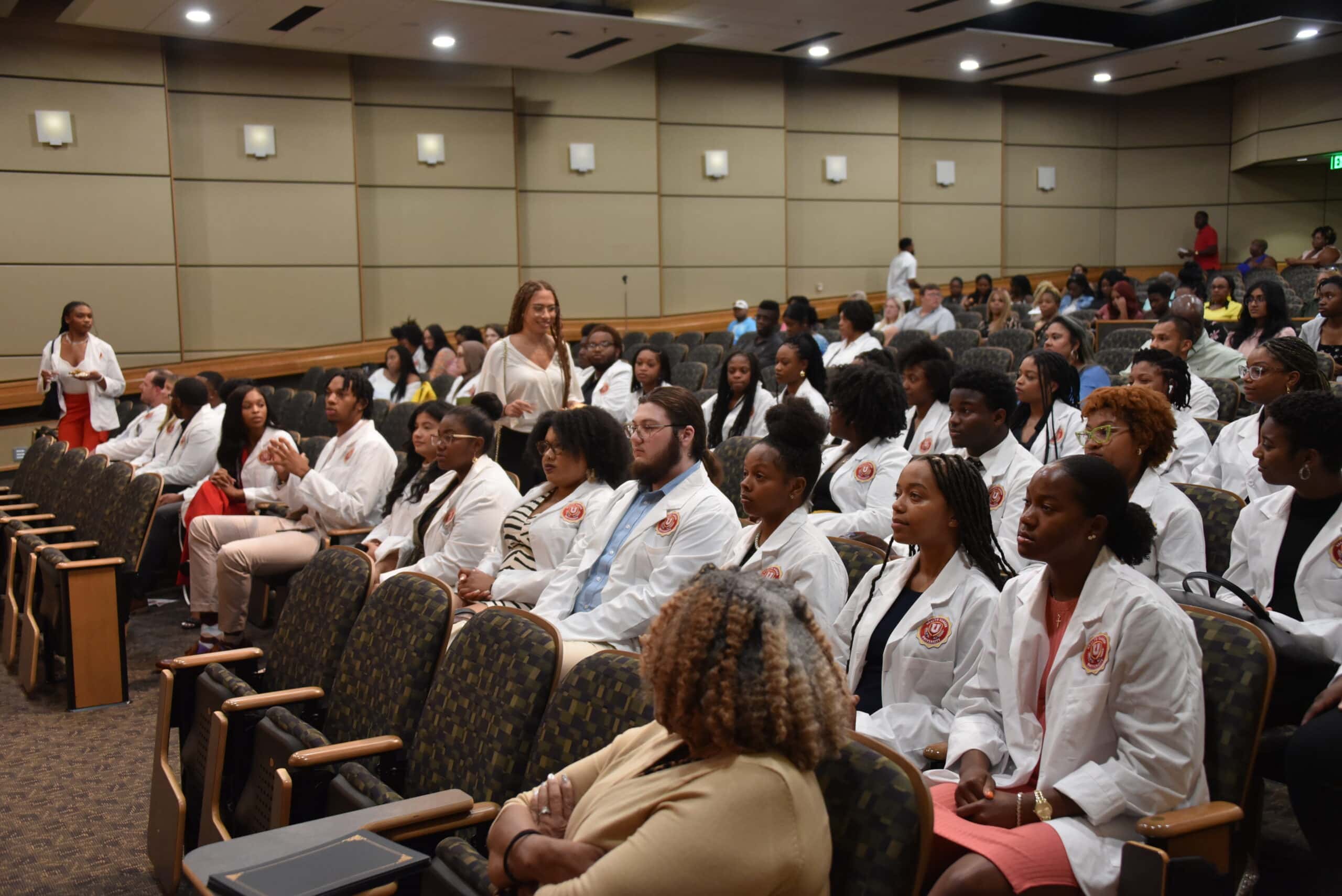UAMS Celebrates Students in Health Career University Programs
| The University of Arkansas for Medical Sciences (UAMS) Division for Diversity, Equity and Inclusion (DDEI) hosted a July 27 celebration to honor students for their summer achievements in Health Career University programs.
Brian Gittens, Ed.D., MPA, vice chancellor for diversity, equity and inclusion, kicked off the Health Career University Summer Bash by applauding the students for all their efforts this year. Noting the academic rigor of Health Career University programs, he praised the students for giving up their summer breaks for an endeavor that will benefit them in the years to come.
“I know it hasn’t been easy, but anything worthwhile — anything worth having — is hard,” he said.

Brian Gittens, vice chancellor for diversity, equity and inclusion, addresses the students during the Health Career University Summer Bash.
An initiative run by DDEI, Health Career University encompasses a variety of programs that serve students from underrepresented backgrounds, providing exposure to health professions and advice on how to get into academic institutions like UAMS. Health Career University operated sevens programs this year in central and southeast Arkansas, serving more than 100 high school, undergraduate and postgraduate students.
“The Division for Diversity, Equity and Inclusion is profoundly committed to your success and to supporting you throughout your academic journey,” Gittens told the students.
Antiño Allen, Ph.D., associate dean of pipeline and career development in the UAMS Graduate School and director of Health Career University’s Summer Research Internship (SRI) program, spoke about the importance of giving students the opportunity to discover what they want to do in their careers — or what they don’t want to do.
“What we try to do at SRI is be a launching pad for students to think about careers in research and about things they can do outside of basic medicine,” he said. “Most people think medical breakthroughs happen in hospitals. In reality, they happen in research labs.”
The eight-week SRI program allows students to expand their understanding of health careers by spending five days a week in laboratory settings, working with mentors and learning how to conduct science-based research. Allen highlighted the program’s role in encouraging greater diversity in the biomedical research workforce, citing the National Institutes of Health’s comprehensive definition of underserved groups.
“‘Underserved’ includes those who face economic hardship, those who live in rural environments and those from many others walks of life,” he said. “The goal is to make sure that everyone has a seat, that everyone’s challenges and situations are acknowledged.”
Health Career University launched last year in Little Rock and Pine Bluff, placing a number of long-existing and newly formed UAMS programs under a single umbrella with the goal of laying the groundwork for students to pursue careers in health care. The initiative expanded this summer, adding sites in Camden and Magnolia. It also created a Pre-Nursing Summer Scholars program that helps aspiring nursing students prepare for their entrance examinations.
Jennifer Laudadio, M.D., professor and chair of the Department of Pathology in the UAMS College of Medicine, announced during the Summer Bash that Health Career University will add a pathology technician program in the coming year.
Laudadio said she’s using the Aubrey J. Hough Jr., M.D., Distinguished Chair in Pathology to fund two yearlong positions for recent Bachelor of Science graduates to work in UAMS pathology labs. The students will gain exposure to some of the learning environments they’d experience if they went to medical school, and they’ll receive mentorship and career guidance.
Gloria Richard-Davis, M.D., MBA, executive director of DDEI, said Health Career University continuously works to improve its program offerings. She said the initiative is designed to provide real-world opportunities in clinical settings, as well as hands-on experiences in biomedical and bioinformatics research.
“These are experiences not generally accessible or afforded to students from underserved areas, but they are key to their success in health care,” she said.
Richard-Davis praised the students who participated this year, describing them as future leaders in the health care field.
“We are so proud of all that you’ve done,” she said. “We’ve seen your work ethic this summer, and we know you’re already on the path to success. We can’t wait to see your future accomplishments.”
While the Summer Bash served as a closing celebration for most of the students, it marked a beginning for members of the Serving Underrepresented Populations through Engagement and Research (SUPER) Project. The program, which begins in July and concludes the following May, teaches undergraduates how to conduct community-based research focused on health disparities in Arkansas.
Alyssa Joseph, a rising junior at the University of Arkansas at Little Rock, said her first few days in the program had already shown her the value of Health Career University.
“I was looking for an internship that really focused on helping underserved communities,” she said. “For me, it’s important to be in health care and to represent Black women. I want to be able to make a difference.”
Lyric Williams, a rising sophomore at the University of Central Arkansas, took part in the Pre-Nursing Summer Scholars program during the summer and is now participating in the SUPER Project. Williams said SUPER has given her the opportunity to meet with medical professionals and learn about a wide variety of career opportunities in health care.
“It’s opened my eyes to the different avenues I can pursue in medicine,” she said.
